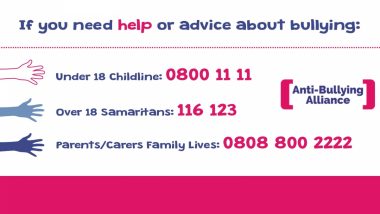Bullies picking on the weak and vulnerable is an age-old problem. But now, as the world unites against an invisible virus, anti-bullying charities are hoping we can all unite against bullying and really make a difference.
 As Anti-Bullying Week (November 16-20) begins, Martha Evans, director of the Anti-Bullying Alliance, points out that if everyone, including parents, children, teachers and politicians, pulls together to tackle bullying and the misery it causes, change will happen.
As Anti-Bullying Week (November 16-20) begins, Martha Evans, director of the Anti-Bullying Alliance, points out that if everyone, including parents, children, teachers and politicians, pulls together to tackle bullying and the misery it causes, change will happen.
“This year, more than ever, we’ve witnessed the positive power that society can have when we come together to tackle a common challenge,” says Evans.
“Anti-Bullying Week is no different. Bullying has a long-lasting effect on those who experience and witness it. But by channelling our collective power, through shared efforts and shared ambitions, we can reduce bullying together.
“As a parent, you’re a vital piece of the puzzle in tackling bullying.”
Evans says it’s natural for parents to worry about bullying, particularly if they’ve experienced it themselves, or think their child may be vulnerable.
The good news, she says, is there’s a lot parents can do about it, and here she outlines how they can help beat bullying…
1. Know the signs
You know your child best. Look out for any changes in their behaviour – for example becoming quieter or withdrawn or acting up and getting in trouble. You may notice they’re reluctant to go to school or take part in their usual activities, or they may become upset after using their phones or devices, or complain of frequent unexplained illnesses like tummy upsets or headaches. You may find they aren’t sleeping properly, or show signs of sadness or anxiety. If these tell-tale signs become apparent, its time to talk and find out what’s troubling them.
2. Know when to step in
Your child will not get on with everyone. They may be on the receiving end of name calling or negative comments, occasionally they could feel left out or alone. They’ll make friends and lose friends. They’re likely to have arguments and disputes. All of these experiences are normal and an important part of childhood development, but when these upsets are repeated and intentional, and your child is being picked on by an individual or group in a position of power, it’s bullying and it needs to stop.
If your child has been seriously harmed or is at risk of serious harm, then this is an urgent safeguarding issue and you should seek immediate help and call 999 or your local children’s services team. If your child has been on the receiving end of prejudicial behaviour because of their race or faith, disability, gender, sex or sexuality, even if this was a one-off incident and you don’t consider it to be bullying, it’s important to alert your school as it may point to a wider issue in the culture of the school that needs to be addressed.
3. Work with your child’s school
If your child is being bullied, it’s important you speak to the school about it as soon as you can. Schools have a legal duty to prevent bullying and harassment. Most schools will have an anti-bullying policy, or their approach to preventing and responding to bullying will be included in their behaviour policy. This is often available on the school website and if not, your child’s school must provide you with a copy by law.
When speaking to the school, you may be upset and angry but it’s important you approach the situation calmly and focus on what you can do together to resolve the bullying. You may find it helpful to write down what’s happened, the impact it’s had on your child, and to keep a note of any contact you’ve had with the school.
Your child needs to feel included in these discussions – they may not be part of every meeting or phone call, but it’s important you’ve listened to what they want to happen.
4. Talk about bullying
Anti-Bullying Week is a great opportunity to start a conversation in your household on bullying and consider the steps you can take together if it happens.
So mark the date in the family calendar and chat with your children about what their school’s done to celebrate Anti-Bullying Week and what it means to them. There’s a pack for parents on the Anti-Bullying Alliance website with lots of activity ideas and conversation starters to help you bring Anti-Bullying Week to your home.
5. Access the resources on the Anti-Bullying Alliance website
The Anti-Bullying Alliance website has some amazing tools, resources and events to ensure that we are all ‘United Against Bullying.’ Click here
WHAT EVERY CHILD NEEDS TO KNOW:
- It doesn’t matter what colour hair you have; what trainers you are wearing; how you speak; how you walk; how you talk – it is not your fault if you get bullied. We are all different in some way and that’s what makes us amazing.
- Whether you are a boy or a girl, old or young, big or small – bullying makes you feel rubbish and it’s okay to be upset about it. The important thing is that you tell someone about it.
- If you feel you can, talk to a teacher you trust or a family member. If you don’t want to do that you can always call Childline 0800 11 11 or visit www.childline.org.uk.
- Write down what happened, when it happened, and who was involved. If the bullying is online, keep the evidence – save or copy any photos, videos, texts, e-mails or posts.
- It can be tempting if you are being bullied to take revenge – for example to send a horrible message back to someone; to try and embarrass and hurt the other person, or to fight back. This is not a good idea – you might end up getting in trouble or get yourself even more hurt.
- Think about other ways you can respond to bullying. For example, practice saying ‘I don’t like it when you say that/do that – Stop.’ Think about other people who can help you if you are being bullied – this could be other classmates, or a teacher.
- Only spend time with people who make you feel good about yourself. If someone constantly puts you down they are not a real friend/ boyfriend/ girlfriend and not worth your time.
- Be kind to yourself, and do things that make you feel good, relax and make new friends. You might make music; write lyrics; draw cartoons; dance; act or join a sports club. This is your life so make sure it’s the best life possible – don’t let anyone bring you down.
- Remember to respect other people! Just because someone is different to you and your friends – that doesn’t mean you are better than them or have a right to make them feel bad. If you mess up, say sorry. You don’t have to be friends with everyone – but you should always make it clear that you don’t like it when people bully others, and stick up for people who are having a hard time.










